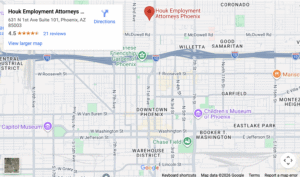
Non-solicitation agreements can be powerful tools for protecting business owners in Phoenix, AZ. These agreements protect employers from former employees who may solicit valuable employees. Convincing an employee to leave can have a negative impact on the business.
Non-solicitation agreements can also be designed to protect businesses against employees who may wish to solicit their customers and clients. The laws governing non solicitation agreements in Arizona are complicated and detailed. You may wish to execute a new agreement or enforce an existing document. Either way, having an experienced Phoenix non-solicitation lawyer in your corner is critical.
At Houk Employment Attorneys, we have over 48 years of experience handling complex cases like yours. We have the tools to protect your interests. We represent both individuals and business owners in Phoenix, Arizona. You probably have questions about the laws governing non-solicitation agreements. If so, contact us to arrange a confidential consultation today at (480) 569-2377.
How Can Houk Employment Attorneys Help With Non-Solicitation Agreements in Phoenix?

A business’s customers and employees are often its greatest assets. When an employee leaves to start a new venture, they may be able to take those assets with them. On the employer side, preventing these losses is critical. Non-solicitation agreements can provide important safeguards.
It’s important for employees to have a reasonable opportunity to succeed. Our team at Houk Employment Attorneys represents employees who struggle with unreasonable contract terms and employers who attempt to create or enforce non-solicitation agreements.
When you hire our Phoenix employment law attorneys, you’ll have an entire legal team to:
- Carefully review the terms of any existing agreement
- Help you craft an agreement that is enforceable in court
- Investigate and gather evidence to determine whether a non-solicitation agreement has been violated
- Handle all paperwork and legal issues
- Advocate fiercely to protect your interests in court and during negotiations
We’re always here to discuss your case. Contact our Phoenix employment lawyers to schedule a confidential consultation today.
Non-Solicitation Agreements in Phoenix: An Overview
The primary purpose of most non solicitation agreements is to prevent former employees from soliciting business from the former employer’s customers. Many employees develop relationships with customers during the course of their employment. When they leave to start a new business venture or join a new firm, they’re often in a position to convince their former clients to jump ship.
Non-solicitation agreements and non-compete clauses have gained a huge amount of attention in recent months. Earlier in 2024, the Federal Trade Commission (FTC) went so far as to ban the use of nearly all non-compete agreements in the workplace. That ban was extended retroactively to invalidate existing agreements.
However, in the wake of significant legal challenges, courts have now barred the FTC from enforcing its ban. For the time being, non-compete and non-solicitation agreements continue to be viable ways of protecting a business.
Are Non-Solicitation Agreements Enforceable in Arizona?
The enforceability of non solicitation agreements in Arizona is determined by the courts. The standard for assessing the enforceability of any given contract has been developed via court decisions over the years.
For a non-solicitation agreement in Phoenix to be enforceable, it generally must:
- Protect a legitimate business interest
- Be reasonable in both scope and duration
- Not contain terms that violate Arizona public policy
- Not unreasonably restrict the rights of the employee
Each of these elements is important. Arizona courts can decline to enforce a non-solicitation agreement if any element is violated.
The analysis is highly fact sensitive. If you have questions about the enforceability of a non solicitation agreement, our attorneys in Phoenix are here to help. Contact Houk Employment Attorneys to learn more about this area of law today.
When Does a Non-Solicitation Agreement Protect a Legitimate Business Interest?
Non-solicitation agreements can be designed to protect any number of legitimate business interests. Some examples of business interests that the agreement may protect include:
- Trade secrets
- Patents
- Client lists
- Custom business practices or policies
These are issues involving information that is not generally available to the public. It’s critical to establish that the non-solicitation agreement in question genuinely protects a legitimate business interest. Absent that business interest, it’s highly likely that courts will decline to enforce the agreement.
When Are the Terms of a Non-Solicitation Agreement Considered Reasonable in Arizona?
It’s important to remember that a non-solicitation agreement shouldn’t be so broad that it makes finding employment unnecessarily difficult.
Reasonable Time Restrictions
Most non-solicitation agreements do contain specific time restrictions. In other words, they’ll only prevent a former employee from soliciting business for a certain period of time. Whether a time restriction is “reasonable” depends entirely on the facts and circumstances. In one case, an Arizona court found that a one-year duration of a non-solicitation restriction was reasonable.
However, it’s always possible that a longer restrictive period may be more appropriate when the employee is a high-level executive with access to confidential business information. Shorter time frames may be better for lower-level employees with less access to critical information.
Reasonable Geographic Restrictions
Many non-solicitation agreements contain geographic restrictions. For example, a former employee may leave to start their own venture and offer services at a discounted rate. The non-solicitation agreement may prevent them from soliciting new business within a certain geographic location. Geographic restrictions are less relevant in today’s mobile society. Still, many agreements do still contain these provisions. That’s especially true for smaller businesses.
Geographic restrictions must also be reasonable in nature. It’s important to ensure that the geographic restriction isn’t so broad as to prevent the employee from finding new employment. Courts are unlikely to enforce restrictions that cover extremely broad geographic areas. That is, of course, unless the employer can show a legitimate reason for the broad restriction.
Non-Solicitation Agreements and Arizona Public Policy
A non-solicitation agreement would violate public policy if it harms the public in a significant way.
For example, it may be against public policy to prevent an employee from working in their field at all. Agreements that prevent a former employee from working with a business owner’s clients entirely are likely unenforceable.
When Does a Non-Solicitation Agreement Create an Undue Hardship for the Employee?
The undue hardship prong is typically directly tied to the reasonableness of the contract. Courts consider whether the employee will be able to find meaningful employment given the terms of the agreement. If they can’t, the agreement will likely create an undue hardship. When the terms of the agreement are overly broad, courts are more likely to find those terms unenforceable.
What Should I Do If I’ve Signed an Unreasonable Non-Solicitation Agreement in Phoenix?
It’s important to review the terms of your agreement carefully. Before signing, the best way to protect yourself is to have an experienced Phoenix non-solicitation attorney in your corner. Of course, it’s possible that you’ve already signed the agreement. Employees don’t always have a full opportunity to consider the terms with an attorney before they’re hired.
If that’s the case, and you believe the terms of your non-solicitation agreement are unreasonable, here are some steps you can take:
- Examine the terms: Examine terms such as geographic scope, time limitations, and the exact activities that are prohibited.
- Negotiate: It’s important to identify the terms that you believe to be unenforceable. After that, your employer may be willing to negotiate to reach a fair agreement.
- Document the situation: Keep good records of all communications with your employer. Keep any documentation related to the agreement and your employment generally.
- Avoid a breach: It’s always best to comply with the terms of the agreement while you try to reach a solution. Breaching the contract can have adverse consequences if the agreement is later found to be enforceable.
It’s always a smart idea to hire an experienced employment attorney sooner rather than later. Your attorney can sit down and review the terms of your agreement. Once we understand those terms, we’ll have a better idea of whether the agreement will be enforced.
At Houk Employment Attorneys, we’re always available to review your case. Contact us today to learn more about how we can protect your rights.
What is the Difference Between a Non-Compete and a Non-Solicitation Agreement?
Non-compete and non solicitation agreements are very similar. The same issues are relevant when determining enforceability. The difference lies in the prohibitions contained in the contract. Non-compete agreements prevent an employee from competing with the former employer. Non-solicitation agreements prevent the former employee from taking business from their former employer.
Contact a Phoenix Non-Solicitation Lawyer for a Confidential Case Review Today
Do you have questions about the validity or terms of a non-solicitation agreement in Phoenix, Arizona? Contact Houk Employment Attorneys today. Our experienced Phoenix non-solicitation lawyers can review the terms and help you understand your legal rights and options.
Our employment law firm in Phoenix also provides:
- Employer retaliation Lawyer in Phoenix, AZ
- Federal Employees Lawyers in Phoenix
- Non-Compete Attorneys in Phoenix, AZ
- Overtime & Minimum Wage Attorney in Phoenix
- Paid Sick Time Attorneys in Phoenix, AZ
- Phoenix Breach of contract Lawyers
- Phoenix Non-Solicitation Lawyers
- Phoenix Sexual Harassment Lawyers
- Race Harassment Lawyers in Phoenix, AZ
- Separation Agreements Attorneys in Phoenix
- Wage and Hour Dispute Attorneys in Phoenix, AZ
- Workplace Discrimination Attorney in Phoenix, AZ
- Workplace Training Lawyers in Phoenix, AZ
- Wrongful Termination Attorneys in Phoenix, AZ

